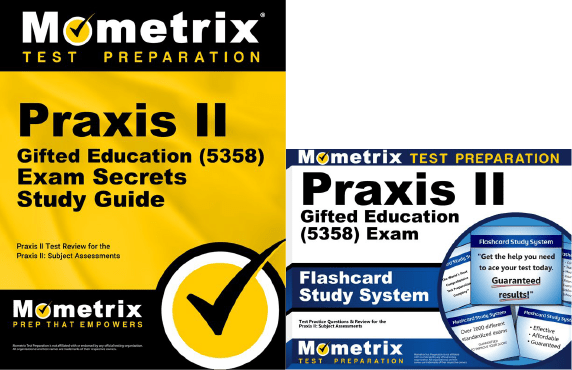If you need help studying for the Praxis Gifted Education test or just want some more information about what the test is like, you’ve come to the right place!
Click below to take a free Praxis Gifted Education practice test!
What’s on the Exam?
First, let’s talk about the questions on the Praxis Gifted Education test. There are 120 selected-response questions in total.
Selected-response questions can appear in several different forms:
- Single-selection multiple-choice
- Selecting ALL correct answers from a list of choices
- Selecting the correct answer from a drop-down menu
- Clicking parts of a graphic such as a map or a chart
- Dragging and dropping answers into a targeted area on the screen
The time limit for the test is 2 hours. There aren’t any scheduled breaks, but you’re free to take restroom breaks as needed!
Let’s take a closer look at the different sections of the Gifted Education test:
1. Development and Characteristics of Gifted Students
25 questions
- Advanced developmental milestones of gifted students
- Asynchronous development
- Early indicators of giftedness
- The role of stakeholders in supporting the development of giftedness
- Similarities and differences between gifted students and general students
- Characteristics of different types of giftedness
- The range of social and emotional characteristics of gifted students
- Factors that may impact the development of gifted students
- Common stereotypes associated with gifted students
- Various causes of underachievement in gifted students
2. Learning Environment for Gifted Students
23 questions
- The impact of a safe, equitable, and supportive environment on learning
- The continuum of placement and delivery of service options
- The influence of social and emotional development on learning
- Developing nonacademic skills of gifted students
- How delivery and identification models are related
- Creating a learning environment that addresses the needs of gifted students
- Instructional activities that are specific to the development of complex cognitive processes
- Promoting higher levels of thinking
- Establishing and maintaining rapport
- Adapting a learning environment based on student input
3. Instruction of Gifted Students
33 questions
- Basic concepts of curriculum development for gifted students
- Major models for developing curriculum for gifted students
- Differentiating the general education curriculum
- Selecting and adapting content for gifted students
- Providing opportunities for students to investigate and extend areas of interest/talent
- Enhancing communication skills
- Planning opportunities to access and use technology in innovative ways
- Academic and career guidance that must be integrated with instruction
- Variables that may affect students’ learning and performance
- Developing observable and measurable objectives
- Developing lesson plans
- Appropriately pacing instruction
- Developing metacognitive thinking in gifted students
- Teaching students self-advocacy and self-regulatory skills
- Addressing the needs of the profoundly gifted
4. Identification and Assessment of Gifted Students
22 questions
- Basic assessment terminology
- Assessment instruments
- Assessment purposes
- Legal and ethical practices related to gifted students
- Interpreting assessment data
- Reporting assessment data
- Nominating and identifying gifted students
- Commonly used qualitative assessments
- Alternative assessments
- Using multiple criteria to identify giftedness
- Factors that can lead to misidentification of gifted students
5. Professionalism
17 questions
- Major theories, foundations, and philosophies of gifted education
- Major legislation regarding gifted education
- Rationales and goals of gifted education
- Publications and professional organizations relevant to gifted education
- Locating and evaluating information on issues and trends in gifted education
- Collaborating with colleagues and school personnel
- Using reflective practice
- Serving as a resources for supplementary opportunities for gifted students outside of school
- The impact of giftedness of families and society
- Helping families understand the implications of a student’s giftedness
- The role of an advocate for gifted education
How to Register
To register for the test, you’ll need to create an account on the ETS website. Once your account has been created, you can submit your application to take the test.
When you submit your registration, you will need to pay the $130 testing fee.
Praxis Scores
The Praxis Gifted Education test is scored using a scaled scoring method. Here’s how it works:
For every question you answer correctly, you get one point added to your raw score. At the end of the test, your final raw score will be converted to a scaled score. This scaled score will range somewhere between 100 and 200. The passing score varies from state to state, but most states require a minimum score of 157.
The reason your raw score is converted to a scaled score is because everyone that takes the test is given a slightly different set of questions. Since everyone has a different arrangement of questions, and because some questions are harder than others, converting your raw score to a scaled score ensures a more even playing field.
FAQs
How many questions are on the Praxis Gifted Education exam?
The exam contains 120 questions.
What is the time limit for the Praxis Gifted Education exam?
The exam is timed at 2 hours.
What is the passing score for the Praxis Gifted Education exam?
The passing score varies from state to state.
How much does the Praxis Gifted Education exam cost?
The testing fee is $130.



 Praxis Study Guide
Praxis Study Guide Praxis Flashcards
Praxis Flashcards